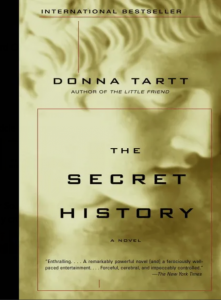The dark academia aesthetic took social media by storm in the 2020s. Defined by Tayla Glowacz as “the romanticization of learning,” the genre conjures up images of tweed suits, gothic architecture, leather-bound books, and the occasional murder. In short, dark academia is about valorizing the elite few privileged enough to dedicate their lives to the pursuit of higher knowledge, where humanities and the arts reign supreme. It’s also a popular literary sub-genre, populated by characters who study in old institutions and come from even older money, whose obsessive and eccentric tendencies often leave them entangled in sinister plots involving drugs or murder or both.
One of the most revered texts within the dark academia subculture is Donna Tartt’s modern classic, The Secret History. Donna Tartt’s sophomore novel is to dark academia what Superman is to superheroes: the originator of the genre, which would later come to influence similar works. Written in 1992, The Secret History follows protagonist and narrator Richard Papen as he falls in love with a group of eccentric but self-obsessed and dangerous Classics Majors. As an inverted murder mystery, the novel skips the “whodunnit” and instead creates tension by taking the readers through the build-up to the crime and its inevitable fallout.
The Plot: Classics And Classism
Richard Papen slogged through a dull working-class childhood in California. When he earns a scholarship to Hampton College, an elite private university in Vermont, he gets a chance to abandon his background and make something more of his life. After enrolling in a highly selective Classics class, he encounters five eccentric students: the charming romantic Francis Abernathy, stoic Camilla Macaulay, Camilla’s hot-headed twin brother Charles, and their de-facto leader, the mysterious linguistics genius Henry Winter. There’s also Edmund “Bunny” Corcoran, a spoiled jokester who — as the prologue reveals — eventually becomes a victim of murder.
It becomes apparent that the entire group is far removed from reality. They have isolated themselves from most of society to dedicate their lives to the study of Ancient Greece and its practices. Most of them have become so self-important that they care little for the consequences of their actions on others. As the group’s choices become more and more atrocious, the book tests the limit of their detachment, trying to see how far they can go before the horror of their actions catches up to them.
Richard Papen: Elegantly Unreliable
Enthralled by their world of obscene wealth and limitless intellect, the once-modest Richard immediately becomes desperate to become part of their in-group. His obsession leads him to romanticize, excuse, and later on participate in the group’s atrocities, including their murder of Bunny.
Dark academia’s obsession with beauty lends to its language — works in the genre strive to blur the lines between prose and poetry. And perhaps Richard’s narration is responsible for this trend. Richard’s voice is complex, poetic, and beautifully structured, so much so that it drives home one of the main themes of the book: that beauty can make evil appear acceptable.
My Thoughts About The Book
As well-crafted as its plot and prose are, The Secret History is not for everyone. The problem with the book is that it cannot seem to decide whether it is critical or aspirational. Though the plot seems to want to condemn its characters and their elitism, the elegant prose used to describe their lifestyles seems deliberately constructed to beget desire or envy. As readers, we’re supposed to question our sympathy for the classics group, but we only developed that sympathy because could not see them outside of Richard’s rose-colored glasses.
However, if you’re looking for a psychological thriller with an exciting plot, The Secret History is a great read. Though the prose can be heavy at times, its world is so richly written that it ultimately sucks readers in. And since the book runs for 500 pages, readers have a long time to get lost in it.
Conclusion
Though it’s likely that Donna Tartt never intended to create a subgenre, The Secret History had such a strong grip on readers that many authors became compelled to reproduce its themes, plotlines, and atmosphere. Readers interested in the genre can look into titles like If We Were Villains, Ninth House, and Ace of Spades.
If you’re interested in dark academia’s strong prose and macabre plotlines, but want to explore works outside the genre, you can consider Madeline Miller’s Circe, which is a book that puts a fresh spin on the Odyssey’s famous witch. Our review of the novel goes more in-depth about its plot, themes, and quality.








